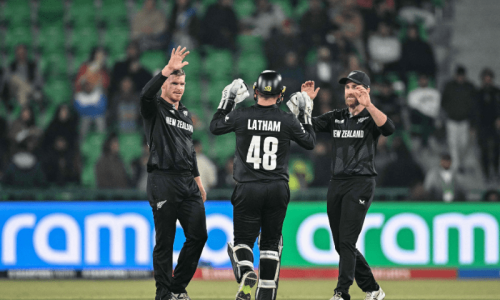 NEW DELHI, Aug 26: India’s best Olympic Games amounted to three medals — not many, perhaps, for the world’s second most populous nation but sports chiefs believe the performance will spark future success for the country.
NEW DELHI, Aug 26: India’s best Olympic Games amounted to three medals — not many, perhaps, for the world’s second most populous nation but sports chiefs believe the performance will spark future success for the country.
Athletes are not so sure, saying poor coaching, bad organisation and a lack of money will continue to hold India back.
“I’m very happy we have three individual medals and that too without hockey,” Indian Olympic Association (IOA) president Suresh Kalmadi said after the Beijing Games ended on Sunday.
India once relied on their men’s hockey team for success but the eight-time champions failed to qualify this time.
Instead, the India team won their first solo gold medal through rifle shooter Abhinav Bindra, plus bronzes for freestyle wrestler Sushil Kumar and middleweight boxer Vijender Kumar.
India had taken more than one medal only once before, at the 1952 Helsinki Games where freestyle wrestler Kashabha Jadhav took bronze alongside the victorious men’s hockey team.
Kalmadi believes the Beijing success will help India to shed its image as a nation that cares only about cricket and inspire the country to greater things when New Delhi hosts the Commonwealth Games in 2010.
“We’ve shown our potential in various sports here which is good for the Commonwealth Games in Delhi,” he said. “We will get a bagful of medals there and then we can go on to [the 2012] London [Olympics].he Beijing medallists won praise, cash awards and overnight fame and sports chiefs, who usually struggle to explain a lack of success, predicted a rosy future.
“Normally even one medal sparks a lot of enthusiasm,” Kalmadi said. “The scenario will definitely change.”
Not everyone shared Kalmadi’s optimism.
Gurbachan Singh Randhawa, a 110 metres hurdles finalist at the 1964 Tokyo Games, agreed the Beijing effort would boost Indian sport but criticised the standard of Indian coaches and poor planning.
“Why don’t we learn some lessons from China?” he asked.
“They have exceeded their medal target but we never achieve the goals we set for ourselves.
“Most of the athletes are trained by our coaches but they have obsolete knowledge,” he said. “They should show interest, have the attitude to learn.”
Most Indian coaches are appointed by the government and often describe the system as slow-moving or biased. Most federation chiefs hold on to their posts for years and, in turn, blame lack of funds for their sport’s plight.
Beijing showed Indian sports officials in a poor light.
The shooters, who were seen as the best medal hopes, complained about a lack of ammunition while the wrestlers were not given a masseur in Beijing.
A woman table tennis player had only a team official to turn to for advice during her first-round loss after the federation sent the coach abroad with a developmental team.
Wrestler Kumar, an Asian Games medallist going in to Beijing, was housed in dingy quarters during training while an inquiry was launched after female weightlifter Monika Devi was pulled out of the Games over a positive dope test, then cleared of wrongdoing when it was too late for her to compete.
Bindra owed much of his success to personal initiative, his wealthy businessman father having built him a range at home and allowed him to fly business class for training trips abroad.
Still, there is hope the newfound enthusiasm could attract companies who are currently focused on sports such as cricket and golf.
Steel tycoon Lakshmi Mittal’s foundation set up two years ago spends thousands of dollars on select athletes, including Bindra.
However, its administrator feels federations should start functioning professionally if India is to see progress.
“We must get good systems in place to keep improving, at present there is no real system,” Manisha Malhotra, a former India tennis player, said.
A good coach cost around $150,000 annually and more companies getting involved could only boost Indian sports, she said.
“It is not just the shortage of money,” she added. “It is about spending it the right way, having the right people in the right place at the right time.
“I need to research for six months to get the right coach,” she said. “Federations can do it with three phone calls but they don’t care.”
—Reuters















































